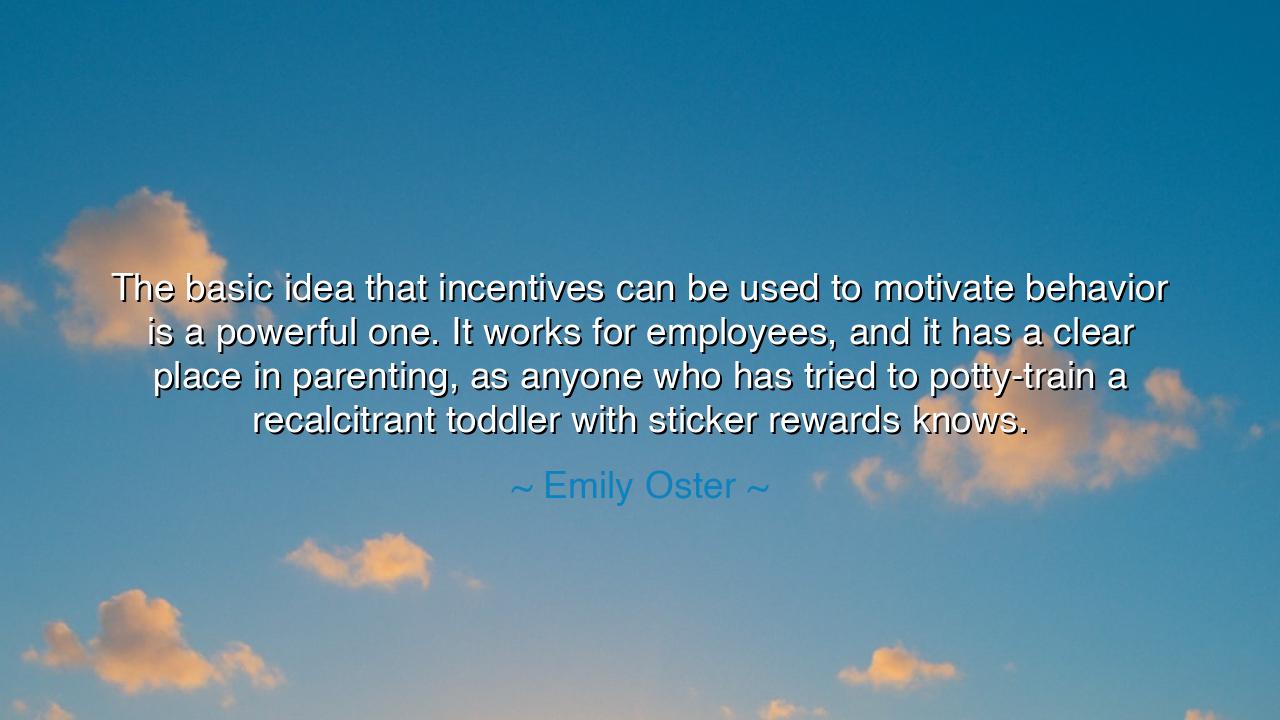
The basic idea that incentives can be used to motivate behavior
The basic idea that incentives can be used to motivate behavior is a powerful one. It works for employees, and it has a clear place in parenting, as anyone who has tried to potty-train a recalcitrant toddler with sticker rewards knows.






Hear the voice of Emily Oster, who speaks with clarity of mind and the wisdom of observation: “The basic idea that incentives can be used to motivate behavior is a powerful one. It works for employees, and it has a clear place in parenting, as anyone who has tried to potty-train a recalcitrant toddler with sticker rewards knows.” In these words lies a principle as old as humanity itself: that incentives move the will, that reward and encouragement shape behavior, and that the same law that governs kingdoms and marketplaces also lives in the quiet struggles of the nursery.
From the dawn of civilization, leaders and teachers have understood this truth. The great rulers did not merely command—they rewarded. Soldiers marched not only for honor, but for land and gold. Students of philosophy sought not only knowledge for its own sake, but the glory of reputation and the satisfaction of mastery. So too in the home: a child resists the stern demand but may be guided gently by the promise of a small prize, whether a token, a word of praise, or the joy of recognition. Oster, with a smile, reminds us that the same truth that builds economies can also potty-train a toddler.
Yet her words carry more depth than humor. She reminds us that parenting is not only about commanding obedience or demanding discipline, but about understanding the human heart—even in its smallest form. A child, like an adult, thrives on recognition, encouragement, and reward. The promise of the sticker on the chart, the gold star on the paper, or the smile from a parent becomes a force stronger than anger, bending behavior without breaking spirit. The wise parent learns that reward often accomplishes what punishment cannot.
History bears witness to this wisdom. Consider the story of Cyrus the Great of Persia. He united vast and diverse peoples under his rule, not by cruelty, but by granting freedoms and rewards. His empire endured because he understood that men fight harder for a leader who rewards loyalty than for one who rules with fear. Just as Cyrus built his empire upon incentives, so too may a parent build the loyalty and growth of a child through encouragement rather than endless correction. The principle is the same—scaled from empires to households.
But Oster’s words also remind us of the danger of imbalance. Incentives are powerful, but they must not become bribes that erode discipline. A parent who gives rewards without boundaries raises a child who values only the prize, not the deed itself. Here lies the ancient paradox: how to use incentives to guide behavior while still teaching the deeper virtues of self-control, responsibility, and integrity. Incentives may open the door, but it is the cultivation of inner strength that allows the child to remain standing when no reward is offered.
The lesson, then, is clear: use incentives wisely, but do not let them rule. They are tools, not masters. They can shape behavior, but only love and consistency shape character. A sticker may train a toddler, a word of praise may encourage a student, but the true goal of parenting is to raise children who act not only for reward, but from virtue. Incentives are the beginning of wisdom, not its end.
Therefore, let all who hear take action: praise your children when they strive, reward them when they persist, but also teach them the joy of doing right for its own sake. Use incentives as stepping stones, but let them lead toward higher ground—the inner satisfaction of courage, kindness, and mastery. For in this balance lies the harmony of parenting: practical in the moment, yet eternal in its vision.
Thus Emily Oster’s words, though grounded in the humor of a toddler’s stubbornness, carry the weight of ancient wisdom: incentives move the heart, but only wisdom anchors it. And when parents learn to guide with both reward and love, they raise not only obedient children, but strong souls prepared to face the trials of life.






AAdministratorAdministrator
Welcome, honored guests. Please leave a comment, we will respond soon